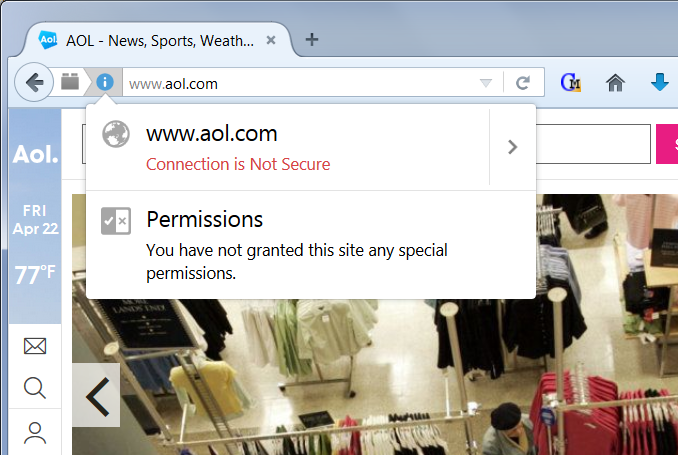
If www.aol.com is not a secure connection should i be viewing pages at aol.com
when I click on the info button of the tool bar or the green lock it shows www.aol.com is not secure, So how safe is to view pages here and what info will they have that I don't want them to have.
Solución elegida
Hi thom8is, what you and I both see is normal for HTTP -- rather than HTTPS -- connections. I am attaching a screen shot for comparison.
What this message refers to is not anything about the website's content, or what the website can learn about you. It means is that the connection over which you are sending data to AOL and receiving data back from AOL is not encrypted. Anyone monitoring the network between Firefox and the website who intercepts the communication can easily read it. And that also creates the risk that they could modify or hijack it.
Now on some sites, that would be a calamity. For example, if this was a financial service or your email or Facebook, an insecure connection opens you up to losing control of your account. But on AOL, it's probably less critical. For example, someone spying on your use of the site would learn what you searched for and what you read, and you might not care if that information "leaks" to unrelated third parties.
You'll have to decide for yourself whether you want to use search and news sites that do not offer secure (HTTPS) connections. You certainly have a lot of choices these days.
Leer esta respuesta en su contexto 👍 1Todas las respuestas (4)
When you are on a regular http connection, Firefox usually hides the http:// part to streamline the appearance of the address bar, so if you only see www.aol.com that is the same as http://www.aol.com/ which is a standard connection to AOL and not a secure connection to AOL.
As a person who does not have an AOL logon, when I try to load https://www.aol.com/ to get a secure connection, I just get redirected back to http://www.aol.com/ -- are you actually getting a green lock on that page?
I don't get a green lock i see the info button and what looks like a grey batter Also I don't have to log into AOL to view the pages.. if you will type www.aol.com in yr browser will see what i am talking about
Solución elegida
Hi thom8is, what you and I both see is normal for HTTP -- rather than HTTPS -- connections. I am attaching a screen shot for comparison.
What this message refers to is not anything about the website's content, or what the website can learn about you. It means is that the connection over which you are sending data to AOL and receiving data back from AOL is not encrypted. Anyone monitoring the network between Firefox and the website who intercepts the communication can easily read it. And that also creates the risk that they could modify or hijack it.
Now on some sites, that would be a calamity. For example, if this was a financial service or your email or Facebook, an insecure connection opens you up to losing control of your account. But on AOL, it's probably less critical. For example, someone spying on your use of the site would learn what you searched for and what you read, and you might not care if that information "leaks" to unrelated third parties.
You'll have to decide for yourself whether you want to use search and news sites that do not offer secure (HTTPS) connections. You certainly have a lot of choices these days.
Thank you very much for yr assistance

